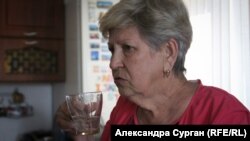Hunger-striking mother of Crimean Tatar jailed in Russia hospitalized
| Publisher | Radio Free Europe/Radio Liberty |
| Publication Date | 3 July 2018 |
| Cite as | Radio Free Europe/Radio Liberty, Hunger-striking mother of Crimean Tatar jailed in Russia hospitalized, 3 July 2018, available at: https://www.refworld.org/docid/5bc05095a.html [accessed 5 June 2023] |
| Disclaimer | This is not a UNHCR publication. UNHCR is not responsible for, nor does it necessarily endorse, its content. Any views expressed are solely those of the author or publisher and do not necessarily reflect those of UNHCR, the United Nations or its Member States. |
July 03, 2018 14:33 GMT
By Crimea Desk, RFE/RL's Ukrainian Service
 Raimе Primova at her home in Sevastopol on June 27
Raimе Primova at her home in Sevastopol on June 27
The mother of a jailed Crimean Tatar man has been rushed to hospital after two weeks on a hunger strike to demand the release of her son, who was convicted of terrorism charges he contends are false.
Crimea-based human rights group Crimean Solidarity said on July 3 that Raime Primova was hospitalized with extremely low blood pressure.
Primova, 68, has a single kidney and has been diagnosed with liver disease.
She told RFE/RL earlier that she started the hunger strike on June 20 after sending a request to Russia's Federal Security Service (FSB) seeking the release of her son, Nuri Primov.
Primova said that she was only drinking water and a doctor was monitoring her health.
Primov was arrested in Russian-controlled Crimea in 2016 and was convicted of being a member of the Islamic group Hizb ut-Tahrir, which is banned in Russia.
Primov, who denied the charge, is serving a five-year sentence in a prison in the Russian republic of Mari El.
Moscow's takeover of Crimea in March 2014 was vocally opposed by many members of the Crimea Tatar population, who make up a sizable minority on the peninsula.
Rights groups and Western governments have denounced what they call a campaign of repression targeting members of the Turkic-speaking Crimean Tatars and others who opposed Moscow's seizure of the peninsula.
Link to original story on RFE/RL website
